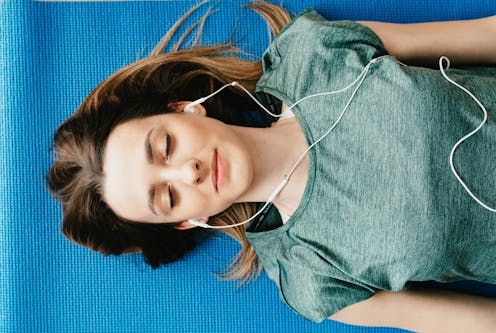What is brown noise? Can this latest TikTok trend really help you sleep?
- Written by Gemma Paech, Conjoint Senior Lecturer, School of Medicine and Public Health, University of Newcastle

The latest TikTok trend has us listening to brown noise[1]. According to TikTok, this has multiple benefits[2] including helping you relax and quickly fall into a deep asleep.
Getting insufficient sleep[3], and insomnia[4] are common. So it’s no wonder many people are looking for ways to improve their sleep.
But can brown noise help? If so, how? And what is brown noise anyway?
What is brown noise? Is it like white noise?
Brown noise, the better-known white noise, and even pink noise are examples of sonic hues[5]. These are “constant” noises with minimal sound variation – highs, lows and changing speeds – compared with sounds such as music or someone reading aloud.
What distinguishes brown noise from white or pink is the pitch (or frequency).
White noise describes sound spread evenly across frequencies. It includes low, mid-range and high frequencies, and sounds[6] like radio static.
White noise sounds like radio static.Pink noise has more low- and less high-frequency sound. It is lower and deeper than white noise, similar to steady rainfall[7].
Pink noise noise sounds like steady rainfall.Brown noise contains lower frequencies than both white and pink noise. It sounds deeper[8], similar to a rushing river or rough surf.
Brown noise sounds like rough surf.Why does noise help some people sleep?
Some people are more sensitive to external stimuli than others. That includes human touch (such as hugs), strong smells, caffeine, bright lights, or noise[9].
So one person can find a sound soothing or relaxing while another finds it distracting and annoying.
Several theories may explain why some people perceive benefits from sonic hues.
1. Distraction and relaxation
Noise can redirect and distract you from excessive overthinking or worrying. Some research shows[10] listening to music helps people to mentally relax, which may help sleep. However, if your thoughts are worrisome or strong, noise alone may not be enough to distract your busy mind.
2. Sound masking
Our brain continues to process external sounds when we sleep and loud noise can wake us[11]. But masking, through constant background noise, “drowns out” isolated loud noise. In a quiet country town, the same car alarm or dog barking will sound much louder and may be more likely to wake us, than in a busy city centre.
3. Classical conditioning
Classical conditioning[12] is a way of learning and can explain how we respond to noise during sleep. If noise is relaxing, then pairing noise with sleep may improve the person’s ability to fall and remain asleep. In this way, noise is a reinforced stimulus for good sleep. If noise is annoying then it will hinder sleep and be a reinforcing stimulus for interrupted sleep.
4. Auditory stimulation
Auditory stimulation[13] is not specific to pink, white or brown noise. This involves low-frequency[14] tones being played in an attempt to “boost” certain sleep stages (for instance, “deep” sleep), perhaps improving sleep quality.
Read more: What the nap apps can really tell you about your sleep[15]
So, is TikTok right? Does brown noise work?
Researchers have not specifically examined the impact of brown noise on sleep. However, there is some limited science about the impact of white or pink noise.
Some studies[16] suggest white and pink noise helps us fall asleep quicker and improves sleep quality, but the quality of science is low.
Auditory stimulation may improve memory in young healthy people[17]. Auditory stimulation using pink noise may increase slow-wave sleep[18] (deep sleep) in older people.
Few studies have directly examined how improved sleep using noise benefits daytime mood and functioning. Ultimately, these are the benefits most of us seek from a good night’s sleep.
Read more: Is it possible to catch up on sleep? We asked five experts[19]
When to get your sleep problems checked out
If you have persistent difficulty[20] falling or remaining asleep, are waking too early, and are feeling unrefreshed during the day, your problems should be checked by a medical professional. Your GP can diagnose, provide treatment options and refer you for treatment if needed.
Relaxation and noise may improve your sleep. However, evidence-based techniques, such as cognitive behavioural therapy[21] for insomnia[22], delivered by a trained health expert, is generally required to address the cause of your sleep issues.
This therapy usually takes place with a psychologist, over four to five sessions. It involves addressing thoughts and behaviours around sleep, looks at why sleep problems may have developed, and how to improve them.
Treating sleep problems appropriately with evidence-based treatments and before they develop into a chronic issue – not relying on recommendations on TikTok – will ultimately lead to better sleep in the long term.
If you’re worried about your sleep, here are some great online resources[23] and fact sheets[24] from the Sleep Health Foundation.
References
- ^ brown noise (www.tiktok.com)
- ^ multiple benefits (www.tiktok.com)
- ^ insufficient sleep (www.sciencedirect.com)
- ^ insomnia (www.sleephealthfoundation.org.au)
- ^ sonic hues (www.theatlantic.com)
- ^ sounds (www.youtube.com)
- ^ rainfall (www.youtube.com)
- ^ sounds deeper (www.youtube.com)
- ^ noise (www.ncbi.nlm.nih.gov)
- ^ research shows (pubmed.ncbi.nlm.nih.gov)
- ^ wake us (theconversation.com)
- ^ Classical conditioning (www.simplypsychology.org)
- ^ Auditory stimulation (www.frontiersin.org)
- ^ low-frequency (www.sciencedirect.com)
- ^ What the nap apps can really tell you about your sleep (theconversation.com)
- ^ studies (www.sciencedirect.com)
- ^ young healthy people (academic.oup.com)
- ^ increase slow-wave sleep (www.nature.com)
- ^ Is it possible to catch up on sleep? We asked five experts (theconversation.com)
- ^ persistent difficulty (theconversation.com)
- ^ cognitive behavioural therapy (theconversation.com)
- ^ for insomnia (www.acpjournals.org)
- ^ great online resources (www.sleephealthfoundation.org.au)
- ^ fact sheets (www.sleephealthfoundation.org.au)

















